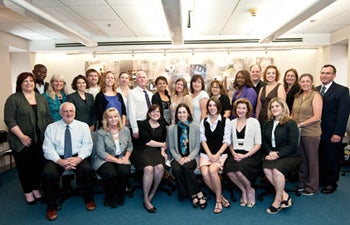USC Shoah Foundation Institute Trains Teachers at Intersection of Holocaust Education and Digital Literacy Studies
The Leichtag Family Foundation has made a major gift that will enable the USC Shoah Foundation Institute to expand its Teacher Innovation Network, a program initiated in 2009 to advance the use of Holocaust eyewitness testimony across the curriculum to build 21st-century skills including digital literacy, critical thinking, and global awareness.
“Our colleagues at partner organizations around the world are doing the vital work to train educators to teach about the Holocaust,” said Stephen D. Smith, USC Shoah Foundation Institute Executive Director. “The Institute is building upon that work by adding a layer of training that not only equips teachers with the skills and tools to incorporate video testimony into their curricula, but also provides valuable digital literacy skills to both teachers and students. The generosity of the Leichtag Family Foundation makes possible this training for many educators over the next three years.”

Participants in the Shoah Foundation Institute’s week-long Master Teacher Workshop with Sharyn Goodson, Program Officer for the Leichtag Family Foundation and Charlene Seidle, Vice President for Philanthropy at the Jewish Community Foundation of San Diego (seated, 3rd and 4th from left); Roger Essoh from Atos Origin (back row, left); and Institute staff Sherry Bard (middle row, left), Kim Simon (seated, right), Sheila Hanson (back row, second from right), and Steven Klappholz (back row, right).
The cornerstone of the Teacher Innovation Network is the Master Teacher Program, piloted in 2009 with Teaching with Testimony, a week-long workshop at the USC Shoah Foundation Institute for nine middle school and high school educators.
“The USC Shoah Foundation Institute’s survivor testimony is a critical tool to personalize and strengthen the ability of educators to teach about the Holocaust — and how these tragic events can be used to impact personal choices today,” said James Farley, Leichtag Family Foundation President and CEO. “The first Master Teacher workshop brought together some of the best and brightest Southern California teachers who have now implemented what they learned into engaging and interactive lessons for their students, which will have far-reaching effects. The Leichtag Family Foundation is proud to build on this initial achievement and partner with the Institute in establishing the Teacher Innovation Network.
Eighteen new Master Teacher candidates attended the 2010 Teaching with Testimony workshop from July 26 to July 30. This year, the USC Center for Multimedia Literacy provided training on video editing and a presentation on ethical editing, and the USC Rossier School of Education helped participants develop questions for students that encourage higher-level thinking.
Over a three-year-period, the Master Teacher Program will build a cohort of more than 40 educators in Southern California and across the United States and train them on the methodology for integrating testimony into classroom projects, creating original testimony-based lessons, and sharing these resources with colleagues. At the end of the three-year period, the Institute will identify between 20 and 25 participants as Master Teachers and invite them to participate in a “best practices” workshop and become ambassadors of the program for years to come, with expertise on the intersection between tolerance education and digital literacy. The Institute will also offer workshops and presentations in partnership with the Anti-Defamation League, the United States Holocaust Memorial Museum, the Museum of Tolerance, and other organizations. The program is expected to reach between 900 and 1,000 teachers and more than 130,000 students.
In addition, the Institute will establish the Teacher Innovation Award to honor educators who exemplify leadership qualities and extraordinary commitment to the use of video testimony in the classroom to promote tolerance and understanding.
For more information, visit the Institute’s Web site, college.usc.edu/vhi.